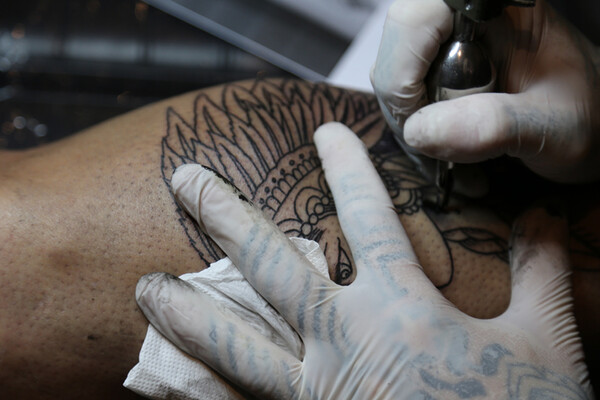The government's recent plan to designate Gwangju as a tattoo regulation-free special zone is facing severe backlash from the Korea Medical Association (KMA), a group of about 130,000 doctors.

The Korea Tattoo Federation (KTF) recently received an official letter of cooperation from the Ministry of Health and Welfare as the leading operator for the designation of a K-tattoo regulation-free special zone in Gwangju, South Jeolla Province.
The KTF said it would proceed with the application and approval process for special regional zones through the Ministry of SMEs and Startups.
However, the medical community criticized the plan and urged the government to terminate its plan.
"The promotion of K-tattoo regulation-free special zone designation is to allow non-medical personnel to practice tattooing under certain conditions," the KMA said in a press release. "It should never be allowed because it violates the people's rights to health."
The local law regards tattooing as a medical act. Running a tattoo business without a medical license is considered an illegal medical practice and is punishable by imprisonment for up to five years or a fine of up to 20 million won ($16,307).
In April last year, the Constitutional Court of Korea ruled that the Medical Act provision, which stipulated that only physicians can perform tattooing, was constitutional.
At that time, with a five to four vote, the Constitutional Court of Korea dismissed a constitutional complaint that had claimed that Article 27, Paragraph 1 of the Medical Care Act violated the freedom of occupation choice.
Article 27, Paragraph 1 of the Medical Care Act stipulates that no person other than a doctor may conduct medical practice, and a doctor cannot conduct medical practice other than for which they are licensed.
The Constitutional Court stressed that the provision aimed to protect the people's right to life and health, which are important constitutional legal interests, and to fulfill the state's duty to protect the people's health.
"Although the freedom of choice of occupation of claimants who are non-medical workers is restricted, the extent of the infringement cannot be regarded as serious compared to the important public interest," the court ruled.
The court stressed that tattooing involves injecting pigment into the skin using a needle, which carries risks such as infection and side effects caused by dye injection.
"Potential risks from this procedure may affect the recipient and public health," it added.
The KMA stressed that the ruling reaffirmed that tattooing is a medical practice that can adversely affect health and violates the Medical Act if conducted by a non-medical person.
"As the government agency, which should respect the opinions of the highest constitutional interpreting body and protect the health and life of the people, is promoting illegal medical practices directly, the promotion of the tattoo area special zone project must be stopped immediately," the KMA said. "It is absolutely unacceptable to turn an issue related to the health and life of the people into a commercial means by associating it with a specific organization."
Tattoo population is on the rise
According to data released by The Standard, a tattoo dye manufacturer, as of 2018, it is estimated that 3 million people have experienced tattoos in Korea and 10 million people have experienced semi-permanent tattoos such as eyebrows and lips.
The KTF has also come up with an estimate that the number of people receiving tattoos is increasing by 1 million yearly.
Although it is still illegal to practice tattooing without a doctor's license in Korea, such data show that one out of four people has experience with tattoos, including semi-permanent makeup.
However, data showed that only a few people go to hospitals to receive tattoos.
In a health ministry report in 2019, which surveyed 171 people with tattoos, only one person, or 0.6 percent, said that he/she received a tattoo at a medical institution.
The rest of the participants answered that they received treatment at tattoo shops (66.3 percent), and beauty parlors (24.3 percent), which are illegal under the current law.
The public's view on tattoos is also becoming more positive.
In a tattoo awareness-related survey conducted by market research firm Embrain Trend Monitor, a market research agency, targeting 1,000 adult men and women in 2018, 70.9 percent of the respondents answered that the perception of tattoos has become more lenient than in the past. Also, 52.9 percent of respondents said tattoos are a way to express oneself.

